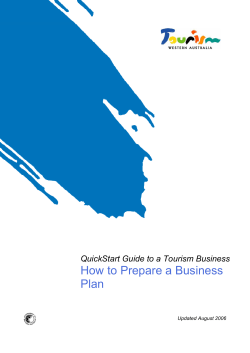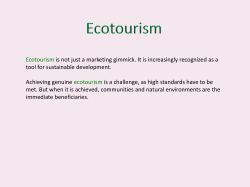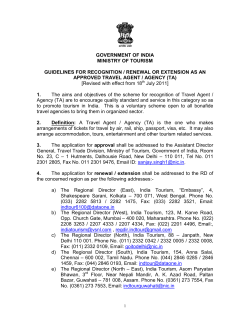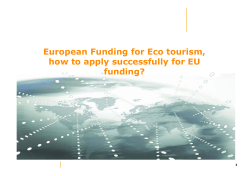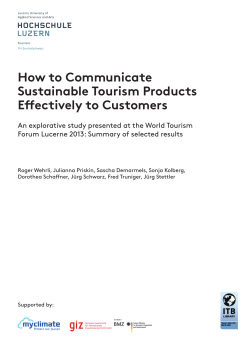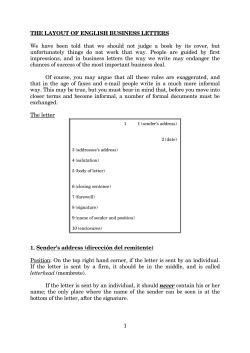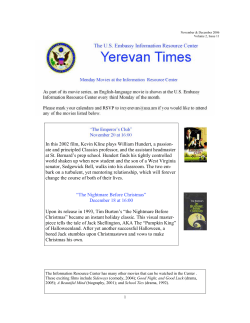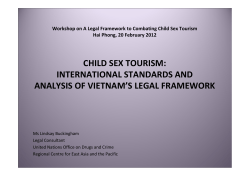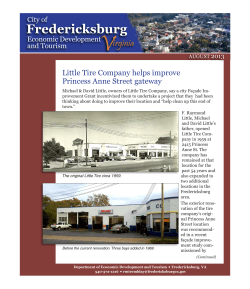
Integrating Business Skills into Ecotourism Operations Training Workshop Summary Introduction
Integrating Business Skills into Ecotourism Operations Training Workshop Summary Introduction IUCN, in partnership with Kuoni, the Swiss travel company, organized a training workshop for the conservation community in Kenya, Tanzania and Rwanda, to build business skills and share experiences for successful ecotourism development. Increasingly, conservation organizations see tourism as one of the sectors with most potential for linking conservation to economic development. However, as many organizations have limited “business” experience, tourism products and services can fail the market test. The training, jointly convened by IUCN, the Swiss Federal office for the Environment, Kuoni and Private Safaris, aimed to promote the transfer of skills between tourism professionals and the conservation community as a first step to making ecotourism development market-viable. It provided participants with an insight into the tourism reality so that tourism businesses/products can become a successful tool for conservation. The workshop also supported participants to understand the ecotourism potential of their proposed products and sites as well as providing support in product development and marketing. 1 This workshop is integrated into the wider project entitled “Supporting Ecotourism Businesses for Conservation”. The project seeks to capitalize on the wealth of knowledge and experience that exists in the tourism industry to help design successful ecotourism products. The project is organized into three steps: 1. Understand the context (tourism market and natural values) 2. Build capacity – “Integrating business skills into ecotourism operations” workshop 3. Further support organizations to bring their products to the market Overview of the workshop The training workshop on “Integrating Business Skills into Ecotourism Operations” took place from 20 to 24 June in Nairobi, Kenya. It brought together 35 participants from approximately 20 organizations located in Kenya, Tanzania and Rwanda. The participation included conservation organizations, community organizations and protected area managers. The aim of the training workshop was to provide participants with a strong foundation in business skills that will enable them to design and run successful ecotourism businesses. The training covered 6 themes: (i) Market context; (ii) Ecotourism Potential; (iii) Business Planning; (iv) Sustainability; (v) Health & Safety, and; (vi) Marketing, Sales and Customer care. For each theme, an instructor from the business community presented the key elements for success in the theme and highlighted practical steps for implementation of their recommendations. Presentations were followed by individual and group exercises where participants were invited to apply the learning and share their experiences. The classroom element of the workshop was then complemented with a field visit to ecotourism businesses jointly developed by two of the participants: the African Conservation Centre and the South Rift Association of Land Owners. The workshop finished with a discussion on how to maintain the momentum created by this training. 1 Ecotourism is “responsible travel to natural areas that conserves the environment and improves the wellbeing of local people” (The international ecotourism society – TIES) 1 Workshop objectives • • • Enable conservation organisations and protected area managers to better understand the risks and opportunities of developing ecotourism; Create awareness of the importance of analyzing tourism potential, creating a business plan, understanding the market and marketing tools as well as paying attention to the health and safety aspects when developing a tourism business; Enhance the capacity of conservation organizations and protected area managers to design (or improve) ecotourism products so that they become economically viable and positively contribute to biodiversity conservation. My ecotourism business Fig 1 – Examples of ecotourism businesses by the participants Workshop Themes Market Context Instructor: Thomas Iten, Managing Director, Private Safaris (EA) Ltd. Summary: The tourism industry is composed of a multitude of actors that operate at different scales from local to regional and global. These players offer a multitude of facilities and experiences that cater to a varied client-base. The aim of this session was to provide a better understanding of the tourism industry in East Africa and how it is set up. Key messages: • Tourism is a important revenue generator in East Africa • International tourists come to the region for safari and beach holidays • In the region, there are few destinations and these are well-established • Accessibility is key • The domestic market is still untapped and looking for new destinations and products • When designing your product, it is important to know your market segments © Sabine Loetscher-Ehrler, Kuoni © Sabine Loetscher-Ehrler, Kuoni 2 Exploring the ecotourism potential of a site Instructors: Thomas Iten, Managing Director, Private Safaris (EA) Ltd. Kahindi Lekalhaile, CEO, Ecotourism Kenya Summary: Which tourism products/locations have the greatest potential to succeed? What elements determine their success? This theme provided participants with a better understanding of the market requirements that make a destination interesting and a product commercially viable. Key messages: • Consider what makes your product unique • Tell a story – an enticing story results in an enticing experience • Be honest – are you delivering to the promise? • More can be achieved with involvement, education and empowerment of local communities • Remain innovative – Keep trying new things Business planning Instructor: David Gachuru, General Manager, Sarova Stanley Hotel Summary: A successful business needs to be supported by a long term and well designed business plan. This session summarised the key elements that need to feature in a business plan, including, setting up the business, making the business economically viable, financial planning and staff management. Key messages: • In the planning process, it is important to visualize the big picture of a finished ecotourism business/product • In financial planning: o plan to stay in business – create short, medium and long term financial goals o set priorities – Cash first, then profits and finally growth • There is no such thing as a fixed price in a dynamic marketplace • In staff management: o recruit for attitude and train skills o the future of organizations is in ideas, so give people the opportunity to be creative Ensuring sustainability Instructor: Sabine Loetscher-Ehrler, Project Manager Corporate Responsibility, Kuoni Travel Holding Ltd. Summary: The participants, being representatives of conservation organizations have considerable knowledge of sustainability issues. This short session provided an overview of sustainability from a business perspective and gave participants a set of criteria for the sustainability their tourism business. © Sabine Loetscher-Ehrler, Kuoni Key messages: • Maximize positive impacts of your business operations and minimize adverse ones • Map & analyse your business’s greatest impacts (economic, social and environmental) • Develop a written sustainability policy and integrate it into core business operations • Engage staff in sustainability • Define clear key performance indicators for each of your focus issues 3 Focusing on Health & Safety Instructor: Teresa Njeri, Lecturer, Kenya Utalii College Summary: Safety is not something that can be advertised as a benefit when providing a tourism product. It is an essential condition expected by consumers that can be costly to a business when things go wrong. This theme drew upon the regulatory environment of the tourism industry with regards to health and safety to better inform tourism product design. Key messages: • Assess and manage your risks: o Identify Hazards o Decide who might be harmed and how o Evaluate the probability of occurrence o Evaluate the seriousness of occurrence o Record your findings o Take actions to mitigate the risk o Review progress • Develop a H&S strategy that takes into account risk of location and product • Preparedness reduces the negative impact and speeds recovery Marketing, sales & customer care for your ecotourism business Instructor: Michael Njogu, Head of Sales & Marketing and M.I.C.E. Summary: Tapping into the right channels for marketing a tourism product is one of the key elements in a viable tourism venture. This last theme provided an overview of the marketing process from product development, to targeting the right market segments and to distribution through mainstream channels. © Maria Ana Borges, IUCN Key messages: • Know your product • Know your market and to whom your product will appeal • Know your unique selling points • Know your competition - what they do and what sets your business apart from them? • Keep the customer smiling! © Sabine Loetscher-Ehrler, Kuoni World Heritage and Tourism As the region possesses a number of high profile natural World Heritage Sites, a focus was placed on promoting sustainable tourism in these sites and enhancing World Heritage Site managers’ knowledge of sustainable tourism planning and practice. Representatives from Lake Turkana National Parks, Selous Game Reserve and Serengeti National Park participated in the workshop and presented their work. 4 Field visit The field visit took place in the South Rift Valley region of Kenya where the African Conservation Centre (ACC) and the South Rift Association of Land Owners (SORALO) have worked together to develop community based tourism. ACC and SORALO operate three lodges in this region: Shompole, in partnership with a private investor; Loisiijo Lodge and Sampu Lodge. The three lodges cater to different target markets with Shompole focusing on high-end tourists and the other two to the adventure tourist market. A research centre at Lale’enok also hosts researchers and student groups. In their presentations, ACC and SORALO explained how they have worked together with the local communities to develop their products as well as the key challenges that they have faced in doing so. Next steps & business skill needs In the last session of the workshop, participants were asked for their views on desired follow up activities as well as additional business skills they wish to gain. The outcomes of the session are listed below: 1. Establishing a regional body to promote ecotourism businesses. Two different structures were proposed: © Maria Ana Borges, IUCN i) A “regional ecotourism umbrella body” or a “regional ecotourism, communication, networking and training subcommittee” ii) A “community mouth piece” that will: a) champion agreements between communities and investors, and b) develop community ecotourism enterprises to a “competitive level” 2. Additional business/management needs: Public/private/community partnership skills; diversification and value addition to ecotourism products; business planning; marketing and branding, and; monitoring and evaluation. The feedback will be incorporated in the development of phase three of the project. Resources and further information 2 IUCN Kuoni Group Private Safaris FOEN ACC SORALO www.iucn.org www.kuoni-corporate-responsibility.com www.private-safaris.co.ke www.bafu.admin.ch www.conservationafrica.org/en www.soralo.org © Maria Ana Borges, IUCN For information on this project visit the project webpage at: http://www.iucn.org/about/work/programmes/business/bbp_our_work/tourism/ecotourism/ecotourism_ea/ 2 5
© Copyright 2025





